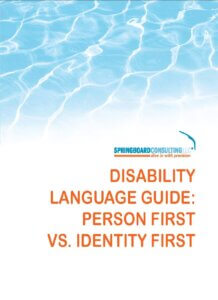DISABILITY LANGUAGE GUIDE: PERSON-FIRST VS. IDENTITY-FIRST
A self-directed on guide on whether to use person-first language or identity-first language when describing a person who has a disability.
 |
Disability Language Guide: Person-First vs.
|
ABOUT THE GUIDE:
Language is an extremely powerful tool in our society. It shapes how we think about our world, how we understand it, and the people in it.
Negative language leads to harmful actions, discrimination, abuse, stereotypes, disenfranchisement, and violence. This is true whether we are speaking about race, gender, sexual orientation or disability. Words like “retard” or “retarded” are derogatory and dehumanizing.
And how we define ourselves and others is a complicated subject for everyone, it is especially so for individuals with disabilities. There are many words and labels regularly used that immediately cause others to think that people with disabilities, especially intellectual and developmental disabilities, as not being able to achieve the things that others can.
As a result, it should not be surprising that there is debate within the disability community on whether to use person-first language or identity-first language when describing a person who has a disability.
People with disabilities tend to have strong preferences about which language to use when describing themselves, and others with disabilities. There are many reasons for this, but in particular is the long history of avoidance, exploitation, stigma, and misunderstanding when it comes to how people with disabilities have been and continue to be identified, portrayed, and talked about.
In some ways, the use (or not) of person-first language compares to the use of appropriate and respectful gender terminology when speaking about individuals who self-identify as non-binary gender, etc. (i.e., not cis-male or cis-female). When thinking about language in this way, you realize it is not only an issue of identity and power, but also an issue of ethics.